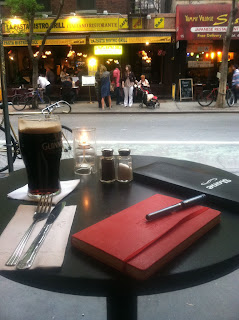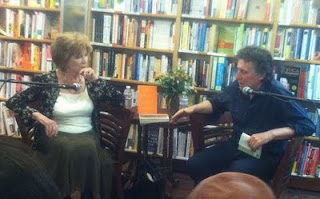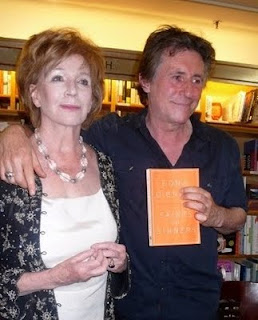 My writing has changed, and I blame (thank?) McNally Jackson. Without actor Gabriel Byrne liking the bookstore so much, I would’ve never had the chance to meet and chat with one of my literary heroes -and my writing wouldn’t be experiencing the painful if necessary (and deeply overdue) growing pains it is now.
My writing has changed, and I blame (thank?) McNally Jackson. Without actor Gabriel Byrne liking the bookstore so much, I would’ve never had the chance to meet and chat with one of my literary heroes -and my writing wouldn’t be experiencing the painful if necessary (and deeply overdue) growing pains it is now.
Over the course of the last six days, my moleskine journal has rapidly filled with stories, characters, and ideas. It’s becoming more than a collection of random, disjointed thoughts. I have a few pages where I quickly jot down observations: shrieking children, over-friendly pets, that teenage girl with the long, dirty hair flirting with her pie-eyed boyfriend. I see so many things in one day that it’s impossible to remember them all, but since last Monday night, I’m making a concerted effort. And I try to take the time now to sit in Union Square or Bryant Park or Central Park, or in front of the library, or any other number of gorgeous New York spots and just sit, breathe, look around, and … write.
In this attempt to integrate personal and profound, the observed and the other, I can’t help but think back to the incredible, inspiring things that flew from the lips of author Edna O’Brien. The Irish author was interviewed about her new collection of short stories by Byrne (a good friend and also Ireland’s Cultural Ambassador) at McNally Jackson as part of an Imagine Ireland initiative. The event was hastily organized; to quote the store’s twitter stream, “If Gabriel Byrne calls up and says, “Hey, I’d like to do an event with my friend Edna O’Brien in approximately zero days?” You just say yes.”
 It’s hard for me to verbalize the effect O’Brien’s work has had on me the last few years, particularly her latest work, a collection of short, powerfully moving stories. Her use of langauge is deeply poetic and loudly, proudly recalls some of the best in Irish writing, namely James Joyce and Seamus Heaney, but with the distinctly feminine voice and brisk narrative quality of Clare Boylan. O’Brien is in a class by herself, however. Born in County Clare in 1930, she had, like many of the time, a convent education and, in her conversation with Byrne, spoke dramatically of the limitations and restrictions placed on her and fellow students. There’s a refreshing honesty to both her work and to seeing her read and speak in person. O’Brien is a very theatrical person, and, even in conversation, carefully chooses her words, drawing out vowels and making dramatic pauses, as if she’s delivering the best damn monologue you’ve ever experienced.
It’s hard for me to verbalize the effect O’Brien’s work has had on me the last few years, particularly her latest work, a collection of short, powerfully moving stories. Her use of langauge is deeply poetic and loudly, proudly recalls some of the best in Irish writing, namely James Joyce and Seamus Heaney, but with the distinctly feminine voice and brisk narrative quality of Clare Boylan. O’Brien is in a class by herself, however. Born in County Clare in 1930, she had, like many of the time, a convent education and, in her conversation with Byrne, spoke dramatically of the limitations and restrictions placed on her and fellow students. There’s a refreshing honesty to both her work and to seeing her read and speak in person. O’Brien is a very theatrical person, and, even in conversation, carefully chooses her words, drawing out vowels and making dramatic pauses, as if she’s delivering the best damn monologue you’ve ever experienced.With her thick hair, gorgeously pale, smooth skin and an unmistakable twinkle in her eyes, O’Brien is positively magnetic, and it makes reading her work later all the more rich and consuming. Every time I’ve picked up Saints And Sinners (her latest work, published by Back Bay Books) since last Monday, I’ve heard her lilting voice, those dramatic pauses, the quavering bits, the quiet bits, the queenly bearing, the Sheela-na-Gig, Lillie Langtry and Danu, combined, condensed, conspiring and co-habitating, all of them singing through every syllable, in her infinitely smart, sexy, strong voice. O’Brien’s work is epic, mythical, and vital, but it’s also deeply personal, and, as the Guardian rightly observes, “loss is inextricable from love, and from living – and that what saves us, if anything does, is the telling of that truth.”
 Telling the truth isn’t always easy – especially when it’s sitting there in front of us. Some truths are easier to swallow than others – and once we discover them, it’s up to us how we choose to live with their loud mewlings, awkward quietude, and late-night bawling. Do we pretend they’re not there? Or face that truth square-on? On Monday night, Byrne confessed to her that, back when he was growing up in Ireland, “I read your work to find myself.” The author seemed stunned, caught off guard by such an admission, and responded, carefully and wide-eyed, “You mean to find an identity? a larger sort of identity?” Byrne re-phrased things so as not to put her on the spot, but we all knew what he meant, as he looked at his friend with a mix of awe, admiration, and gratitude.
Telling the truth isn’t always easy – especially when it’s sitting there in front of us. Some truths are easier to swallow than others – and once we discover them, it’s up to us how we choose to live with their loud mewlings, awkward quietude, and late-night bawling. Do we pretend they’re not there? Or face that truth square-on? On Monday night, Byrne confessed to her that, back when he was growing up in Ireland, “I read your work to find myself.” The author seemed stunned, caught off guard by such an admission, and responded, carefully and wide-eyed, “You mean to find an identity? a larger sort of identity?” Byrne re-phrased things so as not to put her on the spot, but we all knew what he meant, as he looked at his friend with a mix of awe, admiration, and gratitude.I read her work to try to find myself too – and lately I’ve been adding to that portrait through vigorous, enthusiastic bouts of writing. Where to go with this unfolding narrative, and what to do once I get there -if I get there -remain mysteries, but perhaps that’s how it should be. Honesty as salvation feels, to me, like a good place to start.
Thank you McNally Jackson, and thank you, Edna. The moleskine is calling.
Bottom photo courtesy of Rose Hartman.
All other photos are on my Flickr photostream.
